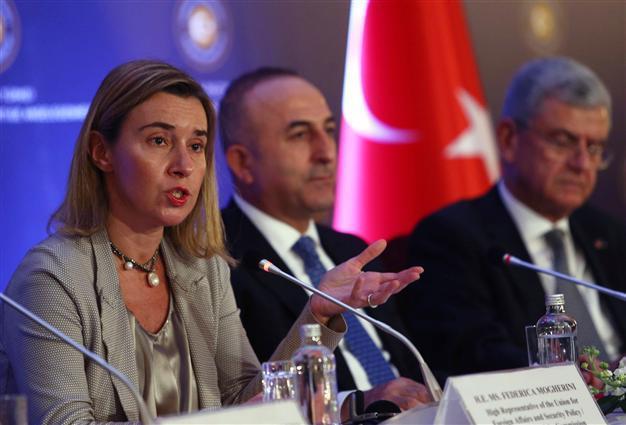EU, US criticize Turkey for lifting immunities of lawmakers
BRUSSELS / WASHINGTON

EU High Representative/Vice-President Federica Mogherini is seen with Turkish Foreign Minister Mevlüt Çavuşoğlu (C) and Turkish EU Minister Volkan Bozkır in a file photo. AFP photo
Both the European Union and the United States have raised serious concerns over the lifting of the parliamentary immunity of dozens of Turkish lawmakers.
The EU expressed concern that the move would pose a risk to the freedom of expression of democratically elected members of parliament.
“Today’s decision by the Turkish Parliament to permit the lifting of parliamentary immunity of a large number of Members of Parliament is a matter of serious concern,” read a joint statement issued by EU High Representative/Vice-President Federica Mogherini and Commissioner Johannes Hahn late on May 20.
“In line with relevant international recommendations, immunity must apply to all on a non-discriminatory basis and decisions on lifting immunity must be based on the merits of each specific case, according to transparent criteria and not subject to any political considerations,” read the statement.
A constitutional amendment submitted by the ruling Justice and Development Party (AKP) was endorsed by 376 of 550 lawmakers on May 20 to lift the immunities of 148 lawmakers, facing a total of more than 700 pending cases, mostly from the Kurdish-question focused Peoples’ Democratic Party (HDP).
Mogherini and Hahn stressed that the framework for parliamentary immunity should include “specific and objective criteria” for taking decisions on lifting immunity.
“A restrictive interpretation of the legal framework and the constitution in particular continue to pose a risk to the freedom of expression of Members of Parliament in Turkey,” they said.
Meanwhile, Washington is concerned that the adoption of the amendment, which would lift the parliamentary immunity of more than 100 members of parliament, “will have a chilling effect on freedom of speech across Turkey,” said Mark Toner, the deputy spokesperson of the U.S. State Department.
“We understand that the legislation will next be referred to Turkey’s president … A common tenet in democratic societies is equality before the law. However, we firmly believe that the freedom to engage in political speech – even speech which many find controversial or uncomfortable – should and must be protected for everyone. This is especially important when it involves speech by elected representatives of a country’s citizens,” Toner said.
“We are closely monitoring developments regarding this prospective legal change. If this change results in a narrowing of space for political debate, it will erode the quality of Turkey’s democracy,” he added.
